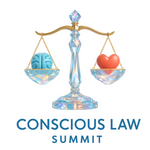Ready to lead a justice system that sees the whole human?
Join the pioneers building trauma-aware courts, policy, and practice.
This is your invitation to explore the science, systems, and stories reshaping how we understand harm — and how we heal it. Whether you're a judge, lawyer, reformer, or advocate, your presence matters.
Pre-register now to gain early access to speaker reveals, workshop highlights, and exclusive content for Conscious Law Summit 2026.
Browse Our Themes
The legal system is not just a structure—it’s a living organism shaped by the minds and hearts of those within it. At this summit, we’ll examine how neuroscience, mindfulness, and trauma awareness are transforming legal education, courtroom culture, and institutional leadership.
From the science of stress to the power of meditation, from grassroots Caribbean initiatives to global reform models, we’ll explore the human technologies shaping a more conscious, compassionate approach to justice.
From the science of stress to the power of meditation, from grassroots Caribbean initiatives to global reform models, we’ll explore the human technologies shaping a more conscious, compassionate approach to justice.
- Choosing a selection results in a full page refresh.









